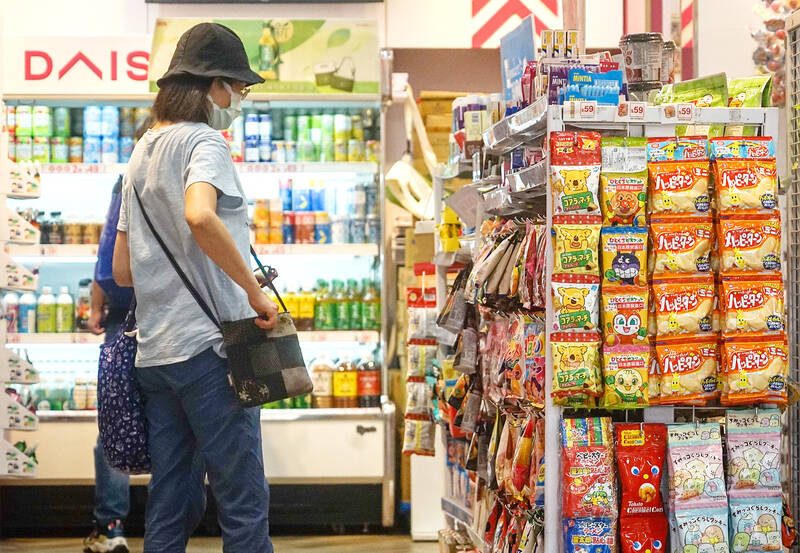Taiwan’s business climate monitor last month flashed “green,” but lost three points, indicating that the economy expanded despite heightened uncertainty, the National Development Council (NDC) said yesterday.
The total score was 24, the lowest since August 2020, as major economic barometers including exports, machinery equipment imports, non-farm payroll and stock prices declined, the council’s monthly report said.
“Uncertainty for exports looms large amid unfavorable developments abroad, but it is too early to interpret the trend as an economic turnaround,” NDC researcher Lin Tzu-fang (林慈芳) said.

Photo: CNA
US graphics card maker Nvidia Corp and notebook vendor Dell Technologies Inc reported disappointing earnings figures for the previous quarter on a slump in end-market demand, boding ill for local firms in their supply chain.
The council uses a five-color system to indicate the state of the nation’s economy, with “green” meaning steady growth, “red” suggesting a boom and “blue” signaling a recession. Dual colors indicate a shift to a stronger or weaker state.
There is no need to be overly pessimistic because an ongoing recovery in domestic demand would help mitigate the impact of external headwinds, the official said, adding that the current quarter would be the strongest in terms of GDP growth, based on the projection of the Directorate-General of Budget, Accounting and Statistics.
The upcoming release of next-generation smartphones by Apple Inc and other brands should shore up business at local assemblers, chipmakers, and suppliers of camera lenses, battery packs and other components, Lin said.
“Therefore, it is better to wait and see how things pan out,” Lin said.
The index of leading indicators, which forecasts the economic situation in the coming six months, shrank 1.56 percent to 95.89, as imports of semiconductor equipment showed positive cyclical movements and the remaining six measures showed retreats, the council said.
It is the ninth consecutive month that the index declined, with a cumulated fall of 7.33 percent, Lin said, adding that the magnitude of correction is not big enough to signal a turnaround.
The index of coincident indicators, which reflects the current economic situation, lost 1.08 percent to 98.33, as all sub-indices except the overall power consumption sub-index softened from one month earlier, the council said.
Domestic tourism has recovered some momentum and is expected to post increases in the coming quarters as authorities are expected to ease COVID-19 controls, it said.
Private investment would hold firm amid a global supply chain realignment, it said.

UNCERTAINTY: Innolux activated a stringent supply chain management mechanism, as it did during the COVID-19 pandemic, to ensure optimal inventory levels for customers Flat-panel display makers AUO Corp (友達) and Innolux Corp (群創) yesterday said that about 12 to 20 percent of their display business is at risk of potential US tariffs and that they would relocate production or shipment destinations to mitigate the levies’ effects. US tariffs would have a direct impact of US$200 million on AUO’s revenue, company chairman Paul Peng (彭雙浪) told reporters on the sidelines of the Touch Taiwan trade show in Taipei yesterday. That would make up about 12 percent of the company’s overall revenue. To cope with the tariff uncertainty, AUO plans to allocate its production to manufacturing facilities in

TAKING STOCK: A Taiwanese cookware firm in Vietnam urged customers to assess inventory or place orders early so shipments can reach the US while tariffs are paused Taiwanese businesses in Vietnam are exploring alternatives after the White House imposed a 46 percent import duty on Vietnamese goods, following US President Donald Trump’s announcement of “reciprocal” tariffs on the US’ trading partners. Lo Shih-liang (羅世良), chairman of Brico Industry Co (裕茂工業), a Taiwanese company that manufactures cast iron cookware and stove components in Vietnam, said that more than 40 percent of his business was tied to the US market, describing the constant US policy shifts as an emotional roller coaster. “I work during the day and stay up all night watching the news. I’ve been following US news until 3am

COLLABORATION: Given Taiwan’s key position in global supply chains, the US firm is discussing strategies with local partners and clients to deal with global uncertainties Advanced Micro Devices Inc (AMD) yesterday said it is meeting with local ecosystem partners, including Taiwan Semiconductor Manufacturing Co (TSMC, 台積電), to discuss strategies, including long-term manufacturing, to navigate uncertainties such as US tariffs, as Taiwan occupies an important position in global supply chains. AMD chief executive officer Lisa Su (蘇姿丰) told reporters that Taiwan is an important part of the chip designer’s ecosystem and she is discussing with partners and customers in Taiwan to forge strong collaborations on different areas during this critical period. AMD has just become the first artificial-intelligence (AI) server chip customer of TSMC to utilize its advanced

Six years ago, LVMH’s billionaire CEO Bernard Arnault and US President Donald Trump cut the blue ribbon on a factory in rural Texas that would make designer handbags for Louis Vuitton, one of the world’s best-known luxury brands. However, since the high-profile opening, the factory has faced a host of problems limiting production, 11 former Louis Vuitton employees said. The site has consistently ranked among the worst-performing for Louis Vuitton globally, “significantly” underperforming other facilities, said three former Louis Vuitton workers and a senior industry source, who cited internal rankings shared with staff. The plant’s problems — which have not